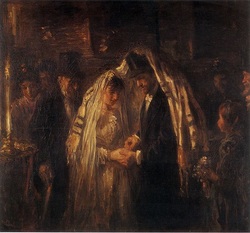
Yitzok wept that not only had he no means to buy his wife a proper gift, but that he also hadn’t given any of his funds to charity, either. Simply, his folded paper and noisy coins had somehow spilled out of his pouch.
Saying nothing, his pals reached into their own, mostly empty, pockets and instead of keeping their change for breakfast rolls, gave Yitzok ten agarot here and half a shekel there for the cost of a bouquet. If they could help Yitzok make his new bride happy, they’d skip a meal.
Yitzok extended his thanks toward his study group. When their rabbi appeared, all of the youths tried to apply themselves to their lesson. Most of them had trouble focusing.
Afterwards, Yitzok’s instructor spoke to Yitzok, privately. The older man sent Yitzok to the yeshiva’s office. Yitzok was supposed to call Yitzok’s brother-in-law to make sure he understood his wife's family's holiday customs. Blossoms were nice, but they might not be enough for his new wife’s joy.
Later that night, feted by half of a loaf of strudel, the two men sat together. Talking to Raphael helped Yitzok a lot. He had not known, for instance, that Tamara liked to use extra long candles during holidays or that she had the habit of using cinnamon and vanilla in her holiday cooking. Before going to sleep, Yitzok walked to the corner store and bought those items.
When Sukkor arrived, Yitzok and Tamara hosted the seven legendary guests, the ushpitzin, as well as Yitzok’s parents, Tamara’s parents, and Tamara’s coworkers. The couple also graciously received nieces, nephews, and neighbors. On the last day of the festivities, Yitzok brought home the friends who had paid for Tamara’s flowers.
Those half dozen youths danced their way between Yitzok and Tamara’s door and balcony. Tamara bit her lip as she watched more and more young men enter her home. She fled into her and Yitzok’s tiny kitchen.
When Tamara reappeared, she was carrying a tureen of chicken and onion stew spotted with bright carrots and tasty okra. Tamara had transformed the two chicken legs, which she and Yitzok were supposed to have eaten that night, into a jolly dinner for eight. She did not know her husband was bringing home so many friends. She wanted him to love their home and her.
In addition to their two undersized buns, which Yitzok sliced as though there would provide enough portions for twenty, Tamara brought out rice, salad, and apples. Tamara was unsure if the young men would notice the food since they were busy singing and praying. Yet, every bite was eaten up.
Tamara returned to the kitchen. She came back to her and Yitzok’s sukkah with a heavy, crystal bowl of compote. Compote was messy, but could be served on the newlyweds’ prettiest plates. Also, compote’s sweet cinnamon and vanilla made Tamara feel like she was being a good hostess.
Although she had frozen that desert for the coming Sabbath, Tamara had chosen to rewarm it in a double boiler and to rededicate it to the present holiday. Her husband’s friends’ smiles made her feel glad she did.
The following morning, Tamara put away the crystal dessert plates. Yitzok soaped, rinsed, and sorted the plastics. He used the small space on top of his and Tamara’s washing machine to store those utensils. Yitzok sighed, imagining filling their washer with pairs of tiny socks. He looked forward to squeezing room from their tiny kitchen for a cradle. There were cinnamon and bright candles in his dreams for the future, too.
KJ Hannah Greenberg's a verbal vagrant who gave up academic hoopla to chase a hibernaculum of imaginary hedgehogs and to raise children. She broadcasts brief fiction about gelatinous shrubs and two-timing algae.
 RSS Feed
RSS Feed